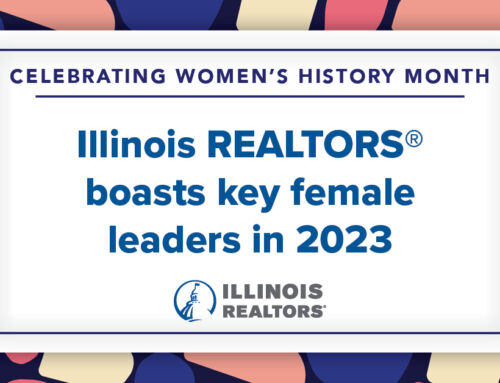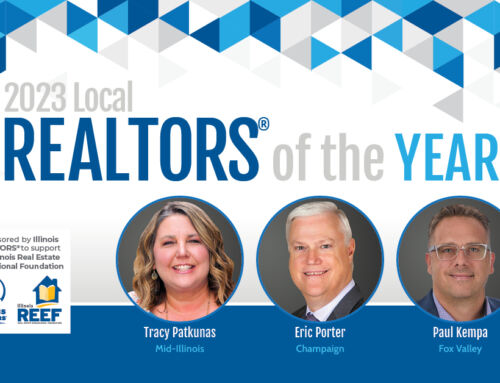
NAR President Vince Malta knows a lot about advocacy.
The San Francisco native has played a key role in helping shape local, state and national associations’ approaches to real estate regulation, and he’s played a key role in making sure that fair housing is at the heart of what it means to be a REALTOR®.
Malta attended the Illinois REALTORS® Public Policy Meetings in East Peoria Jan. 21-23, where he found time to be a guest on the Illinois REALTORS® Podcast. It was a brief stop in a month filled with visits to the national association’s more than 1.2 million members.
Malta said NAR has revamped its approach to working with lawmakers, taking into account that there has been huge turnover in Congress. NAR is non-partisan and is focused on issues related to housing.
“Our issues are not red or blue, they’re purple. They transcend the aisle,” Malta said.
In addition to real estate expertise, Malta is one of the nation’s leading authorities on vintage baseball bats, and his side business of authenticating these artifacts attracts thousands of requests annually.
Characteristically, he approaches the business of authenticating baseball bats in much the same way he approaches real estate. Learn how in the latest edition of the podcast, where he talks about what he looks for when he is asked to authenticate a bat that might have been used by the legendary Babe Ruth.
Transcript below:
Jon Broadbooks: Welcome to the Illinois REALTORS® Podcast. Today we’re joined by a special guest who is visiting us here at the Illinois REALTORS® Public Policy meetings in scenic East Peoria, Illinois. And, of course, I’m talking about Vince Malta. Vince Malta is president of the National Association of REALTORS®. He has been here for the last couple of days and made some remarks this morning which touched on a number of things that I want to be able to have him share with our listeners, ranging from the political environment in Washington and how an NAR is adapting to that political environment. And, as a bonus for you baseball lovers, we will talk a little bit about baseball, only a very specific portion of baseball, authentication of baseball bats. Now, I’m telling you, you want to hang onto the end for this because it’s going to be really, really interesting. Welcome, Vince Malta.
Vince Malta: Oh, it’s a pleasure to be here in Illinois with your REALTOR® members.
Jon Broadbooks: We’re so happy to have you here today. And one of the things that you started out with this morning is you talked about how the political landscape has really changed quite a bit and how NAR is also having to adapt to meet these changes. Talk to me about sort of how big a change this has been for NAR.
Vince Malta: So it’s a huge change because, as you know, government has never been more divided than it is now. I know that’s something that people say every once in a while, but it’s so very true in Washington. And so we wanted to make sure that we adapted the way that we communicate with our legislatures to make sure that our realtor message gets through. And we’ve done several things to achieve that. The first thing being is that we’ve really beefed up what’s called our FPC program, that’s our Federal Political Coordinators where each member of Congress is assigned a person, a realtor, that’s in their community that has a relationship. This may be a REALTOR® that sold a congressperson their first home. They may have gone to school together, they may go to soccer games together with their kids, but they have a relationship, they’ve built up a trust with each other so that they can work better with this congressional member in making sure that they understand our industry, what’s going on in it, and how important our housing and commercial industry is to our nation’s economy.
Jon Broadbooks: One point that you made that I thought was … I really hadn’t stopped and thought about it, but it’s true. There is tremendous turnover in Congress right now. And how in the world can you, as a very large trade organization, probably one of the largest in the country, how do you sort of manage that change?
Vince Malta: So that’s a great question because there’s been a huge changeover. And typically, when someone is newly elected in office, they’re dependent very much on their staff. Very interestingly, the average age of a staff member is 27 years old. And they’re not homeowners, typically. So there is a challenge. So we need to make sure that we’re communicating directly with that congressional member or that we’re able to send people in the office that can communicate with the staffers to make sure that they understand our issues. Now the turnover in 2020, we’re going to have every seat in the House. And for those of you who keep track is 435 seats in the House that’ll turn over. One third of the Senate will turn over. And of course, we’ve got a presidential election this year, which could mean another turnover. So that is a challenge is to making sure that we keep those relationships going, to make sure our message is heard.
Jon Broadbooks: NAR always has taken a stance that ‘we’re not Republican, we’re not Democratic, we’re not independent.’ We’re all about what’s best for our practitioners and the consumers who rely on them when it comes to housing. And so I guess the question here is how do you walk that line in such a hyper-partisan atmosphere?
Vince Malta: You’re right. Our issues are not red or blue, they’re purple. They transcend the aisle. And so we’ve done is we’ve realigned our staff to communicate with them on, let’s say we’ll assign someone to a Democratic staff member, someone to Republican. So we’re dividing that because there’s different rules, there’s different, let’s say different rules in the House versus the Senate. There are different committees that various Republicans and Democrats are assigned to. So those expertises typically go along party lines to make sure that our issues are heard. But again, they do transcend both sides of the aisle. And that’s a very fortunate thing.
Vince Malta: That’s why some of our issues could have bipartisan support, which is, in a divided house, it’s imperative that it has … Because we can get things through the House. But then if there’s no bipartisan support, you can’t get them through, let’s say, Republican Senate when we have a Democratic House. So we’re working very diligently and making sure that we align the right people with the right process.
Jon Broadbooks: Now of course, we went through a big tax reform effort several years ago, Illinois vies with New Jersey for the title, it’s a dubious title, of having the high property taxes in the nation.
Vince Malta: Congratulations.
Jon Broadbooks: Yeah, it’s sort of a race to the bottom I guess. But the question is when you look at the state and local taxes, there is a cap of $10,000 on state and local taxes that you can deduct on your tax forms, which is great, perhaps, if you live in a very low tax state. It’s not so great if you live in a high tax state. And I’m wondering if NAR is working on any kind of effort to try to raise that so you can help people who live in states with such a high tax burden.
Vince Malta: It’s our goal to remove the cap. Okay? Because I think there’s some unintended consequences there. So we were successful in getting the cap removed on the House side. It’s going to be a challenge, of course, getting rude on the Senate side because it’s Republican and they do not want to see the Tax Reform Act of 2017 eroded. And then of course it’d be a challenge again for the president to sign any such thing. So again, we need to look at alternatives. When we were fighting against the Tax Reform Act as proposed, we didn’t really sufficiently provide an alternative. Now, we were very successful in getting changes to the Tax Reform Act to make sure it was more palatable, but we didn’t have viable alternatives to look at. And I think as we move forward, we’re going to make sure that we have more things on the table that we could look at in moving it forward so that it could alleviate some of the effect that it’s had on high cost states in particular. Because we don’t want a policy that’s designed for one size fits all. That’s not the way our nation works. And so, we’re looking forward to putting more things on the table to address what’s happened with the SALT limitations and the cap on them.
Jon Broadbooks: We’re talking with Vince Malta, the 2020 president of the National Association of REALTORS® who is appearing here in East Peoria at the Illinois REALTORS® Public Policy meetings. Vince, you grew up and still live in San Francisco. You’re a huge Giants fan among other things. We won’t hold that against you in this state.
Vince Malta: And remember New York Giants fans, that’s San Francisco Giants.
Jon Broadbooks: Right. It’s entirely different. So let’s be clear on that. But you know, living in San Francisco, I mean, it’s one of the more dynamic real estate markets in the country. It’s also one of the most expensive. And there’s some real profound housing issues that come into play in a market like San Francisco. How did your experience living and working in San Francisco help shape your approach to the NAR presidency?
Vince Malta: Well, thank you for that question. And let me say that it’s been a challenge in providing housing when you have your median home price now approaching $1.5 million. Okay?
Jon Broadbooks: And people complain here when sometimes at certain seasons it gets up close to $300,000 in Chicago.
Vince Malta: Wow. So I’ll say that the reason I got so involved with organized real estate was because of some of the laws that came into effect at the local level. And it was very difficult to get them changed at the local level. So we moved to the state level to get them changed. One of them, for instance, is rent control. Rent control, San Francisco will show you that rent control has had no positive effect on the cost of housing. Anyone that thinks that, there are many studies on that, will prove that rent control is not an effective policy to alleviate or to help affordable housing. So I really got involved at the state level. And we were able to be successful to pass state legislation, which you have currently, thank goodness in Illinois that I hope that you’re successful in maintaining. Because rent control, again, is not the solution.
Vince Malta: So my work at the state level and then getting involved at the national level was from the advocacy side of the organization and understanding that there are different approaches to different issues and that people like to politicize any issue, the homeless, et cetera, to further their political gain. We’re now looking for sensible solutions at all levels of government, local, state, and national. So the way I approach this is that a lot of solutions are best left at the local level if possible, so NAR is looking to invest in those discussions at the local level by providing grants so that you could bring people together in the local communities, your state, and work on solving those issues. There’s only so much we can do regarding, let’s say, the affordability issue at the national level, but there’s so much you could do with the local and state level.
Jon Broadbooks: I do want to shift topics real quick and talk a little bit about fair housing. And I know this is something that you have been working on for some time. This year, it’s really become, I think, more prominent for a couple of reasons. One, we saw that there were allegations of violations in the Long Island area. But then also, you were just recently at a meeting with Ben Carson where NAR was working to try to make their housing a much more prominent part of what we do as a national association and hopefully with every other association. Can you talk to me about sort of the process, what you saw was the real need, and how NAR was going to fill that when it came to fair housing?
Vince Malta: Okay. Interestingly, we’ve been working on beefing up fair housing earlier in 2019 before the Newsday article had come out. And we formed a fair housing committee that looked at fair housing issues across the country. And so, that committee will be starting this year, but it was formed before Newsday. We also had hired Brian Green, who is someone that I hope many of our members will be working with in developing fair housing policies and programs. Brian was hired, also, before the Newsday article. And I think, though, that what’s important is the Newsday article really showed that the importance of what we need to do, not only in the classroom, but actually in practice. And so, we want to make sure that our members are on the leading edge of fair housing and they could apply what they learned in the classroom to actual every day parts of their business. And that’s what act accountability is about in training. And we want to make sure that our members in all states and local have equal educational opportunities to work on fair housing initiatives in their communities.
Jon Broadbooks: I would guess that this means that there’s going to be a very deep attention to programming at NAR events, much more in the way a fair housing content that probably there has been before. Is that fair to say?
Vince Malta: So, right. And you’ll see that in D.C. in May. Fair housing is going to be the centerpiece of what we’re working on in our conferences. It’s so vitally important. So we’ve built that into our culture. It’s been a part of our culture for 112 years. In fact, fair housing, actually right now, our Code of Ethics is ahead of federal law. And so, we’re working very diligently, again, to make sure that’s worked into practice for our members.
Jon Broadbooks: Because federal law, federal fair housing law does not provide protections for gay and lesbian homeowners.
Vince Malta: Correct. But our Code of Ethics does.
Jon Broadbooks: The Code of Ethics does. Do you see a path toward eventually getting that put into the Federal Fair Housing Act?
Vince Malta: It may take time, but absolutely. And we’re working towards that housing equality for all.
Jon Broadbooks: So I promised our listeners that we would also talk a little bit about baseball. Now, you’re a huge baseball fan, as I mentioned. You are a San Francisco Giants fan. But you also have a, I guess it began as a hobby, but then has now sort of become a real sideline for you, and that is authenticating historic baseball bats. Now, how did you get into this?
Vince Malta: So first of all, I love history. And I think that’s why I love baseball so much because it has such a rich history. And with baseball bats, you really learn a lot about a player’s characteristics. It’s the only piece of equipment that they’re allowed to modify in any way, really. By the pine tar, the scoring of a bat, the size, the dimensions, the weight. So it’s something that’s very varied. So when you see the bat, you really learn a lot about how the hitter approaches the batter’s box. So that’s how I got involved with it. I just love the history. But it evolved from collecting to authenticating because as a realtor, I realized that the hobby was very deficient in honesty and ethics and the people that were selling these bats were just selling stories with nothing really behind it. No one was really doing research. There was no knowledge, there was no common definitions.
Vince Malta: So, what happened was I took our principles of what we do as REALTORS® and applied it to the hobby. And when I started collecting bats, there may have been about 30 so-called authenticators that were really just dealers trying to sell stories of bats. And today in the hobby, there’s only a few. And that’s myself and my business partner in New Jersey that takes in the bats and we authenticate them together. And so, it’s something that I think that our principals as being REALTORS® really carry forward and have been very successful for me, allowing me to authenticate and look at some really great bats over time.
Jon Broadbooks: So when you get a bat, let’s say somebody comes in and says, “Well, I have a bat that was used by Babe Ruth dating from the ’20s.” What do you look for? What are sort of the markers that you look for as you go through to authenticate one of these?
Vince Malta: And that’s very important because if it was made in the ’20s versus the ’40s, well, if it was made in the ’40s, we know that Babe Ruth retired in 1935, so he could not have used it. So it’s very important that the bat should speak for itself, not just the story that grandpa gave me this bat and said that Babe Ruth used it. So what I look for is I look at the wood because a wood is something that has to be the right age for the bat. But very importantly, I look at the stampings, the brandings on the bat. And fortunately, Louisville Slugger changed their brandings periodically to match their corporate logo because their names changed over periods of time. So I was able to look at when those brandings changed and within a two year period, many times, I could tell when a bat was made. And then Louisville Slugger opened up their library to me. The first person that they really opened it up to. And I was able to go through their shipping records and determine the length and weight and sometimes model numbers and matching it up with various years. So now we have really good information, not just stories that help us determine whether a bat was made during a specific period of time.
Vince Malta: And lastly, what I look for is I look for player use characteristics. Babe Ruth, for instance, loved to score his bats with a bottle cap and to cut the spin of a ball. And he would do it on the area of the bat that he knew he would hit it. So I know what area the bat that I would be looking for that. And if you really have something really tremendous, Babe Ruth used to notch his bats. Every time he would hit a home run, he would notch a bat just around the oval. And those are real American treasures. If you could find a notch bat that Babe Ruth hit a home run with. People will look at that. It’s like the Gun Slinger. And Ruth probably hit a lot of home runs in a period of time and it’s just an American icon.
Jon Broadbooks: How many bats do you have in your personal collection and what’s your favorite?
Vince Malta: Okay, well I had many bats in my personal collection. But because I authenticate, I no longer own a lot of bats. So I’ve had some great bats. I’ve had a bat that Mickey Mantle hit a home run in the World Series in 1964 to break Babe Ruth’s home run record for World Series Play. That bat is on display in Yankee Stadium now, as well as several of the bats. I’ve had Willie Mays’ bats, who was one of my favorite players, hit a home run. So I’ve had a lot of great bats. Jackie Robinson, another icon of baseball.
Vince Malta: Some of my favorite bats are the bats of the golden era, I would say. From the ’20s through the 1960s of baseball that I’ve enjoyed collecting the most. But I no longer own those bats because I am the authenticator, so I cannot sell a bat. I would disclose that I own a bat and authenticating a bat. And as a realtor, as you know, you disclose those types of things. And so, I really don’t own bats. I really now authenticate them. So I’ve transcended into that.
Jon Broadbooks: How many bats a year do you get asked to look at?
Vince Malta: Thousands. Thousands.
Jon Broadbooks: You can’t possibly do thousands, though.
Vince Malta: So that’s why my business partner in Jersey has several secretaries that help us input all this information and then we look at the bats and do the authentication, the letters and all of that, we do it for private collectors and auction houses in the country.
Jon Broadbooks: Illinois REALTORS® has been talking with Vince Malta, the 2020 National Association of REALTORS®’ president. Vince joins us at the Illinois REALTORS® Public Policy meetings in East Peoria. If you’re interested in hearing other podcasts, please check out our podcast channel. You can find those at podcast.illinoisREALTORS.org. Thanks for listening.


















